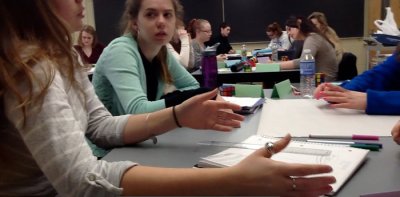Inquiry-Based Learning
The need for more active involvement of mathematics students in the learning process is well documented (e.g. MAA Guide to Evidence-Based Instructional Practices). In the case of Discovering the Art of Mathematics (DAoM), involvement occurs through the use of inquiry-based learning. The DAoM curriculum materials reverse the typical lecture dynamic by being built on guided-discovery investigations.
DAoM materials focus on investigations, tasks, experiments, constructions, data collection and discussion prompts rather than transcribed lectures and worked-out sample problems followed by banks of routine exercises. The transformative impact this has on students in MLA classrooms can be seen clearly in the classroom vignette, student quotes, and videos shown below.
New to Inquiry-Based Learning?
If you are new to Inquiry-Based Learning, come along on a virtual trip into "Our Inquiry-Based Classroom" or visit an IBL classroom in person at Westfield State University. For a first idea about our classroom materials, turn to our blog "Good Activities to Start". To explore how we engage our students in Mathematical Conversations, you may enjoy our blog on "Asking Good Questions". Then follow your interests by diving more deeply into the full listing below.
Audiences
While the focus of this project is on college-level mathematics courses for students in the liberal arts, our experience and expertise with the pedagogy of Inquiry-Based Learning extends far beyond this specific focus. We all routinely teach the full range of college-level mathematics courses using inquiry with strong success: lower-level undergraduate mathematics courses including Calculus I-III, upper-level math major courses focusing on proofs, and content courses for future elementary and secondary teachers. We also work with K-12 teachers in bringing IBL techniques into their classrooms. We currently only have grant support for college-level mathematics for liberal arts. If you are interested in our working with us in other areas (K-12 or non-MLA), please contact us to find out about details and potential costs for such IBL workshops. We do maintain a collection of IBL Resources for courses other than MLA.
Discovering the Art of Teaching and Learning Mathematics Using Inquiry: Table of Contents
This section on the "Classroom" serves as a growing online book about the Art of Teaching using Inquiry-Based Learning. The chapter titles are listed concisely in the side menu for easy access. To find all the section titles for the entire book, please browse through the Table of Contents below. As we're nearing completion of this book please let us know if there's some aspect that you would like to see include.
Getting Started
- What is Inquiry-based Learning (IBL)?
- How to get started with our books ...
- First Class of the Semester: Setting the Stage
- Steven Strogatz: Teaching Through Inquiry - A Beginner's Reflections (Part 1, the workshop experience)
- Steven Strogatz: Teaching Through Inquiry - A beginner’s reflections (Part 2, in the classroom)
- Brian Katz: A Case for Teaching Inquiry
Mathematics for Liberal Arts
- Audience: Learning about our MLA students
- Why use inquiry-based learning in math for liberal arts courses
- Movie “The Proof”: How our students view the process of mathematics
- Goals
- Common Visions and the DAoM Yantra
In the Classroom
- Our Inquiry-Based Classroom
- Classroom Vignette
- A Culture of Curiosity
- Inquiry is Differentiation
- Mindset and Brain Science
- Learning Contract
- Strategies for Grouping Students
- The Risks and Benefits of (the Prof.) not Knowing
IBL in other mathematics courses
- Teaching Calculus using IBL
- DAoM and Math Majors
- IBL Resources, beyond MLA
- Upper-level mathematics: Presentations in Algebraic Geometry
- Courses for future teachers
- PD for in-service teachers
Investigations
- Good Activities to Start
- Choosing materials -- Mixing It Up
- "Cool Things!"
- A Path to Creating Inquiry Activities (*)
- Topic Index - Algebra Book
Mathematical Conversations
- Whole Class Discussions
- Asking Good Questions
- Making Mistakes
- A Perfect Presentation has Mistakes
- Reflecting to Improve Teaching
Proof as Sense-Making
- Download Manuscript
- Inductive and Deductive Reasoning
- Mathematics & Dance Proofs
- 3a + 5b Proofs
- Pennies & Paperclip Proofs
- Pythagorean Theorem Proofs
Assessment Techniques
- Mathematical Autobiographies
- Journals
- Projects
- Notebook and Multiple-Choice Quizzes
- Exams
- Students Creating Solution Sets
- Peer Review for Improving Proof Writing
- Homework Stories
- Class Participation
- Posters
- Learning Contract
- Specifications Grading (and IBL)NEW!!!
Support
- Immerse yourself in IBL at Westfield
- Our Faculty Workshops
- Workshop Vignette
- IBL Resources, beyond MLA
- IBL Practitioners Network and Email Lists
- Does IBL work?
- Art Projects and Art Connections in our Books
- IBL Teaching Bibliography
The Larger World of IBL
- Classroom Video: Jo Boaler & Steve Strogatz
- Guest Blog: Matt Jones, California State University, Dominguez Hills
- Faculty Interview: Angie Hodge, University of Nebraska Omaha
- Faculty Interview: Dana Ernst, Northern Arizona University
Further writing related to inquiry-based learning pedagogy
Student Voices
- Student Voices: Lauryn Zaimes--An Aspiring Teacher Learns About Inquiry by Videotaping a Semester of Calculus
- Student Voices: Rachel Fountain
- Student Voices: Nick Taliceo
- Student Voices: Nickey Cochran
- Student Voices: Sarah Dunn--Mathematics, Running, and Maypole Dancing

